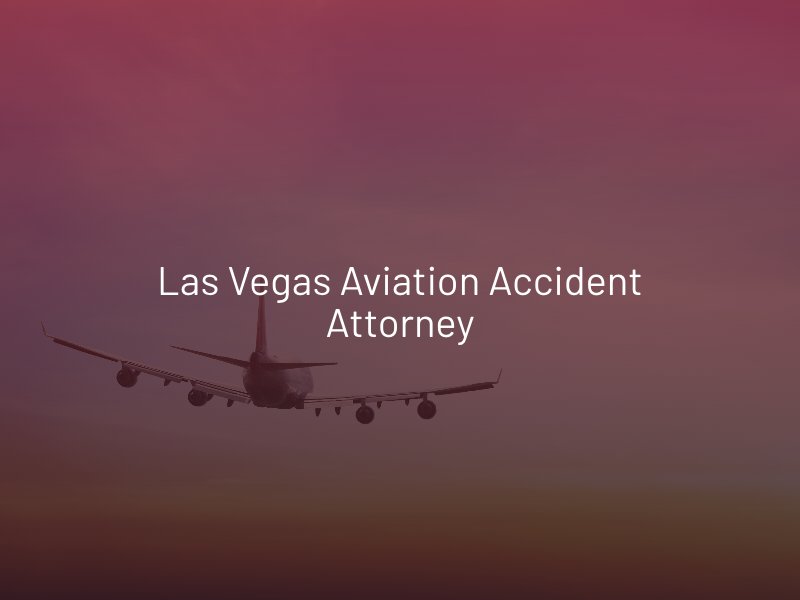Las Vegas Aviation Accident Lawyer
Flying is inherently dangerous, since even small errors can bring an aircraft down, and a helicopter crash or airplane accident typically occurs at a high speed and high elevation. In the event of an incident, an aviation accident attorney in Las Vegas can help protect your rights and get you the compensation you deserve.

How Can a Las Vegas Aviation Accident Lawyer Help?
Recovering compensation after an aviation accident is not always straightforward. It involves determining who is liable, and multiple jurisdictions are often involved. Because of that, it can be challenging to determine where a lawsuit should be filed. However, an attorney with experience in aviation accidents has the resources to investigate your case, analyze the evidence, and select the location that is best for pursuing your claim.
Injuries from aviation accidents are often catastrophic. A lawyer can build your case on your behalf. They will collect critical evidence, such as flight data, cockpit voice recordings, crew training records, procedure manuals, air traffic control records, inspection, and maintenance records, preserve wreckage, and more. They will then determine who can be held responsible and negotiate a fair settlement on your behalf. If the insurance company is unwilling to settle for a fair amount, your Las Vegas personal injury attorney will represent you at trial to ensure your current and future losses are fully covered.
Recoverable Damages in an Aviation Accident
When another party’s negligence is responsible for an aviation accident, you have the right to pursue damages. Damages is a legal term that refers to the compensation victims can recover in a settlement or award as reimbursement for the losses they suffered related to the aviation accident. The types of damages a victim is entitled to can vary case by case. However, the most common types of damages include:
Economic Damages
Compensation for actual financial losses, such as:
- Current and Future Medical Bills: Reimbursement for any treatment you received after the accident, such as emergency care, hospital stays, prescription medications, physical therapy, in-home care, ongoing treatment, etc., and any medical care you are anticipated to require in the future.
- Current and Future Lost Wages: Any income you were unable to earn due to missing work while recovering from your injuries.
- Diminished Earning Capacity: If you can no longer work at the same level as before the accident, you can recover compensation for the difference in income.
Non-Economic Damages
Compensation for losses that do not have an actual monetary value. For instance:
- Pain and Suffering: Compensation for the physical pain and suffering that you have had to and will continue to endure.
- Emotional Distress: If the accident caused mental anguish or psychological conditions, such as terror, anxiety, shock, depression, sorrow, confusion, insomnia, etc.
- Loss of Enjoyment of Life: If your injuries physically limit you from engaging in hobbies, recreational activities, exercise, or any other activities you were previously able to enjoy.
- Loss of Opportunity: The loss of hypothetical opportunities that could have materialized had you not been injured.
- Loss of Consortium: Compensation a spouse can recover if their relationship with the victim has been impacted as a result of their injuries, such as a loss of companionship, services, or sexual relations.
- Physical Impairment (e.g., disability, loss of a limb): Compensation for a permanent injury that interferes with physical activities.
- Disfigurement: If your injury leaves permanent scarring or disfigurement that leads to embarrassment.
Punitive Damages
This type of compensation is rarely awarded and is only granted in cases involving an at-fault party who exhibited an extreme disregard for the safety of others. Punitive damages are intended to punish the defendant and deter similar behavior by others.
How Long Do I Have to File an Aviation Claim?
Each state has a statute of limitations, which is a law limiting the amount of time a victim has to file an aviation accident claim. In Nevada, injury victims have two years from the date of the injury to pursue a claim. If you fail to file within that time, you will be barred from recovering compensation. Wrongful death lawsuits must be filed within two years of the date of the victim’s death.
Types of Aviation Cases We Handle
Our aviation accident lawyers handle all types of aviation cases, including those that involve:
- Commercial Airplane Accidents
- In-Flight Injuries
- Private Plane Crashes
- Small Chartered Plane Accidents
- Helicopter Accidents
- Skydiving Accidents
- Hang Glider Crashes
- Hot Air Balloon Accidents
This is not an exhaustive list. Therefore, please do not hesitate to contact us after any aviation injury. We offer free consultations and will listen to the details of your case and then discuss your potential legal options.
Liability in an Airplane Accident
Individuals who survive an airplane accident have the right to recover compensation from the liable party. However, determining who is responsible can be complex and will depend on the cause of the accident.
Here are the parties commonly named as defendants in aviation accident injury claims:
The Airline
Airline companies are common carriers because it is a method of public transportation. As a result, they are regulated by federal and state common carrier laws and expected to exercise a heightened degree of care when it comes to passenger safety. Everything that can be done must be to reduce the risk of injuries. Any violation of the standard of care expected of the company or its employees subjects them to liability. Therefore, passengers can hold the airline responsible for preventable accidents.
The Pilot
A pilot can be liable for an aviation injury if their negligence or error contributed to or caused it. Examples of pilot negligence include:
- Miscommunicating with air traffic control
- Failure to conduct routine safety checks and procedures
- Failure to accurately monitor speed, altitude, velocity, location, and other critical parameters
- Navigation errors
- Failure to comply with traffic patterns
- Inaccurately using flight equipment
- Failure to safely manage fuel
- Failure to or inaccurately evaluating weather conditions
- Inexperience or a lack of training
The Plane’s Manufacturer
A plane’s or a part’s manufacturer can be liable if a manufacturing defect, design defect, or defective warning contributed to or caused an accident resulting in injuries. A claim against the plane’s manufacturer would fall under Nevada product liability law, which holds manufacturers liable for consumer injuries from faulty or defective products.
The Owner of the Plane
The plane’s owner can be different from the pilot or airline company. When that is the case, and they have some degree of control over the operation and maintenance of the plane, then they may be liable for an injury accident. For example, by failing to ensure the plane is properly maintained, failing to fix a dangerous condition they knew of or should have known about, failing to ensure the pilot was licensed and had the appropriate training, etc.
Air Traffic Control and the FAA
Air traffic controllers can be liable for an aviation injury if they cause or contribute to an accident due to negligence or a preventable mistake. For instance, an error in communication, mistiming takeoffs and landings, failing to clear a runway, sending a plane into occupied air space, failing to consider dangerous weather conditions, etc. Since most controllers work for the Federal Aviation Administration (FAA), the FAA can be vicariously responsible for their employees.
In most cases, multiple parties will be liable, but it will depend on the cause of the accident.
Liability for Wrongful Death
When a loved one is killed in an airplane accident caused by another’s negligent actions, it is considered a wrongful death. Therefore, under Nevada law, the victim’s surviving family or the personal representative of the deceased’s estate can file a wrongful death claim. The party liable for the accident can be held responsible for the deceased’s medical bills and expenses incurred prior to death, funeral and burial expenses, loss of expected income and benefits, loss of services, punitive damages, and more.
Causes of Aviation Accidents
When an inflight breakup, crash landing or takeoff crash occurs, the Federal Aviation Administration performs an investigation into the incident. Causes of helicopter and airplane accidents include equipment malfunction, unavoidable weather issues, and pilot error. Often, an aviation accident is the result of a combination of factors. A pilot’s distraction during a change in the weather, the stress on defective equipment when the craft flies through a storm, or flying at low altitudes to provide tourists a better view — small errors cause fatal crashes.
If faulty maintenance or defective equipment on a plane or helicopter caused the crash, our client may be entitled to a product liability claim. Speak with a Las Vegas product liability attorney to learn more about defective product laws in Nevada.
Pilot error may have resulted from negligent hiring practices on the part of a corporation. Our Las Vegas aviation accident attorneys will coordinate all claims so our client receives maximum benefit. You pay nothing unless we recover compensation on your behalf.
Types of In-Flight Injuries
Aviation cases do not always arise from airplane crashes. Many claims are filed as a result of in-flight injuries, such as severe lacerations, broken bones, traumatic brain injuries, burns, neck injuries, back injuries, strains and sprains, and more. These injuries can occur, for example, due to:
Turbulence
Turbulence can be unavoidable, but pilots can prevent injuries by giving warning and putting on the seatbelt sign.
Falling Luggage
If overhead baggage compartments are not secure and shut fully, heavy pieces of luggage can fall on passengers during flight.
Broken Seatbelts
If a seatbelt breaks or fails to keep a passenger secure during turbulence, landing, or take-off, they can fall or be thrown from their seat.
Service Carts
Heavy airline food and beverage carts can run into passengers or over their feet if flight attendants fail to pay attention or properly secure them.
Torn Carpet or Poor Lighting
Torn carpeting or poorly lit areas can cause slips, trips, and falls.
Hot Liquids
If the hot beverages an airline serves spill on a passenger, it can cause severe burn injuries.
Speak with an Aviation Accident Attorney in Las Vegas Today
If you have lost a member of your family or suffered a serious injury as a result of an airplane or helicopter crash, you need and deserve full compensation for your losses. If you would like to speak to an aviation accident attorney from Harris & Harris Injury Lawyers, please contact our office to arrange a free, confidential consultation.
Our aviation accident lawyers are available. We will fight so that you get a just and fair representation. Call a Harris & Harris physical injury attorney in Las Vegas: (702) 384-1414 or toll-free 1 (800) 393-2350.


